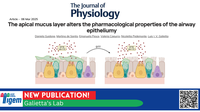The apical mucus layer alters the pharmacological properties of the airway epitheliumy
Authors: Daniela Guidone, Martina de Santis, Emanuela Pesce, Valeria Capurro, Nicoletta Pedemonte, Luis J. V. Galietta
Year: 2025
Sources: The Journal of Physiology
Abstract:
Electrogenic transepithelial ion transport can be measured with the short-circuit current technique. Such experiments are frequently used to evaluate the activity of the cystic fibrosis transmembrane conductance regulator (CFTR), a cAMP-activated chloride channel that is defective in cystic fibrosis, one of the most frequent genetic diseases. Typically, CFTR activity is estimated from the effect of CFTRinh-172, a selective CFTR inhibitor. Unexpectedly, we found that CFTRinh-172, in addition to PPQ-102, another CFTR inhibitor, caused only partial inhibition of CFTR function, particularly in epithelia in pro-inflammatory conditions, which are characterized by abundant mucus secretion. We hypothesized that the mucus layer was responsible for the poor activity of CFTR inhibitors. Therefore, we treated the epithelial surface with the reducing agent dithiothreitol to remove mucus. Removal of mucus, confirmed by immunofluorescence, resulted in highly enhanced sensitivity of CFTR to pharmacological inhibition. Our results show that the mucus layer represents an important barrier whose presence limits the activity of pharmacological agents. This is particularly relevant for CFTR and the evaluation of therapeutic approaches for correction of the basic defect in cystic fibrosis.
Category: journals

